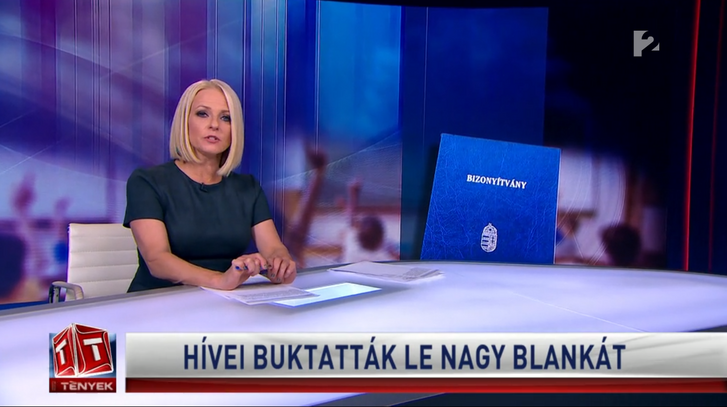Hungarian propaganda machine continues onslaught against high school student

An entire segment on the evening news devoted to the less-than-stellar grades of an eighteen-year-old countryside high school student might sound like something lifted from the plot of a somewhat tired episode of a Saturday morning cartoon, but this is the sad reality of Hungary's pro-government propaganda media.

This semester she barely received passing grades for several subjects. Besides that, her grade book is full of ones and twos.
Anikó Marsi, TV2's news anchor presented the groundbreaking piece of information found in court documents on the country's second most-watched news programme on Tuesday in a matter-of-fact way. With thinly veiled schadenfreude in her voice, she added that the lawyer of opposition party MSZP (who represented the student pro-bono) attached the grade book of the "leftist-liberal side's potty-mouthed orator" to an ongoing lawsuit "just to clear the name of his defendant, but the manoeuvre failed," omitting the fact that the lawsuit in question was a defamation case against pro-government media outlets that she ended up winning. The subsequent report continued to chastise her for her grades and even mentioned that on the day of her appearance in a political talk show, she justified her absence from school with a "questionable medical certificate." The report concluded by citing its source article that read:
This way, it won't be easy for the socialists to follow the instructions of Timmermans and make some kind of a role-model out of the foul-mouthed student who managed to get 10 ones and 9 twos.
Grades in Hungary
Hungarian schools employ the following grading system:
1 - Insufficient (failing)
2 - Sufficient (weakest passing grade)
3 - Mediocre
4 - Good
5 - Excellent
The story, originating from pro-government tabloid Ripost, also appeared in other major outlets controlled by the gigantic pro-government media conglomerate assembled last year, and the few Fidesz-affiliated press organisations not yet under its umbrella (including TV2, formerly owned by the late Andrew G. Vajna).
Blanka Nagy, a high school student from Kecskemét gained notoriety for her rather heated speeches held at a number of rallies during the series of anti-government protests prompted by the passing of the Overtime Act last December. In her speeches, she did not refrain from obscenities: at her first appearance at a demonstration in Kecskemét on 20 December 2018, she characterised Fidesz as a "disgusting, treacherous, ugly, and infectious plague," saying that
"this disgusting band of thieves, this oligarch-government are filling their pockets for their old days, while you will suffer in poverty as a pensioner,"
urging her audience to engage in non-violent resistance and Fidesz MPs to "take a step back and fuck themselves in the face." She employed similar rhetorics at later protests as well.

This, of course, attracted the attention of pro-government media - the first wave of reactions criticised the student's style, some even went as far as Zsolt Bayer, founding member of Fidesz and long-time right-wing pundit, who called the high schooler a "cretin, an idiotic animal, a hapless, miserable, lousy, rotten little prole," which some could even consider fair game given her own expressions, like the government's chief of staff Gergely Gulyás who characterised Bayer's remark at his weekly press conference on 24 January 2019 as "proportional." But in the second round, Fidesz-affiliated Figyelő, Origo, and Lokál published articles citing a piece by pro-government tabloid Ripost claiming that she is a constantly absent, horrible student who will not be able to take her graduation exams.
Blanka Nagy responded by filing a defamation lawsuit against origo, lokál, and Ripost, but documents of these lawsuits were eventually used for the current demeaning reports.
The court of first instance ended up ruling in her favour though, stating that these outlets spread false rumours, instructing them to issue corrections, but they are yet to abide by the decision. Figyelő issued a rectification voluntarily. Why the pro-government media decided once again to go after her now is utterly incomprehensible, as Nagy Blanka's last public speech was almost four months ago, at a protest on 19 January 2019. Since then, she withdrew herself from public life, as she wants to concentrate on her final exams, she told hvg.hu in February.
Hungary's media market has seen an incredible transformation since Fidesz's ascension to power. Most pro-government media outlets are now under a centralised, giant umbrella organisation encompassing more than 450 titles, that was exempted from competition law procedures by Viktor Orbán himself to preempt a possible spanner thrown into the works by the authorities. The 450 titles were donated to the foundation by various Hungarian oligarchs such as Orbán's informal advisor Árpád Habony, or Hungary's wealthiest man and close friend of Orbán, Lőrinc Mészáros. These oligarchs quickly built their portfolio through a series of hostile takeovers and questionable business practices such as the overnight surprise-closure of Népszabadság, the largest political daily that was critical of the government. This hasty expansion was required because in 2015, former financial mastermind behind Fidesz, Lajos Simicska fell out with the Prime Minister and turned his media portfolio against Fidesz (read more about this conflict here), thus the emergence of this new media empire became a burning necessity, as shown by the amount of public money flooding to them. As the latest available data (June 2018) from Átlátszó.hu shows, the pro-government media outlets, most of which since belong to the conglomerate, had managed to secure as much as 66% of state spendings on advertisement.
(Cover photo: Istvan Huszti / Index)

Support the independent media!
The English section of Index is financed from donations.



Ne maradjon le semmiről!
Follow us on Facebook for more English coverage on Hungary.